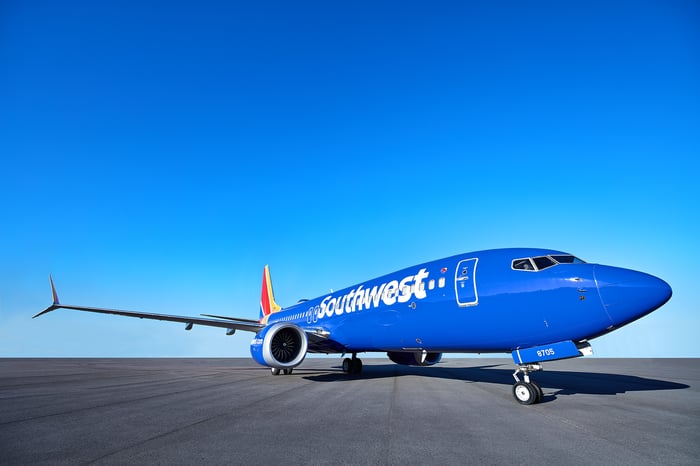Over the past two weeks, long-running tensions between Southwest Airlines (LUV -1.95%) and its maintenance workers (and their union) have come to a boil. Southwest has seen a sharp spike in out-of-service planes, magnifying the impact of severe weather on its operations. As a result, it has experienced an unusually high number of flight delays and cancellations.
The airline and the mechanics' union have traded blame for this situation, but it doesn't really matter who's right and who's wrong. The longer these reliability issues persist, the greater the potential damage to Southwest Airlines' reputation. That's why Southwest needs to do what's necessary to resolve this dispute -- even if it adds to the company's costs over the next few years.
Tensions have been growing
Airline labor contracts never formally expire. Strikes and lockouts are permitted only on rare occasions, when the National Mediation Board, a federal agency, determines that negotiations are at a complete impasse. Nevertheless, it is customary for airlines and their unions to agree on new multiyear contracts -- usually with raises built in -- around the time that the old ones become amendable.
Southwest Airlines has nearly 50,000 unionized employees across a dozen different work groups. Most of its unions -- accounting for 94% of Southwest's unionized workforce -- are working under contracts that are not yet amendable or have become amendable within the past few months.
Southwest's mechanics are by far the biggest exception. This roughly 2,500-strong group is working under a contract implemented more than a decade ago, which became amendable in August 2012. Years of negotiations have failed to result in a new ratified contract.

Southwest's mechanics are working under a decade-old contract. Image source: Southwest Airlines.
Not surprisingly, this stalemate has led to bad blood between the two sides. For example, in late 2017, the Aircraft Mechanics Fraternal Association (AMFA) threatened to block Southwest Airlines from flying to Hawaii due to its maintenance plans. Tensions finally seemed to cool last year, when the airline and AMFA reached a tentative contract agreement, but the deal was rejected by the union's membership, largely based on the proposed pay rates.
Accusations fly
This brings us to this month's events. Beginning around Feb. 12, Southwest Airlines experienced a sharp increase in the number of aircraft out of service because of maintenance issues. The airline generally has up to 20 aircraft impacted by unexpected maintenance problems on any given day, but it has had more than twice that number of aircraft out of service in recent days.
Southwest Airlines declared an "operational emergency" on Feb. 15 to address the spike in maintenance issues, threatening to fire any mechanics who missed work without a valid doctor's note. Nevertheless, the problems have been getting worse, not better. Southwest canceled nearly 200 flights last Tuesday, about half because of maintenance issues. The carrier then canceled more than 400 flights both on Wednesday and on Thursday, as severe weather began to have a bigger impact on its operation.

Southwest Airlines has seen a spike in maintenance-related cancellations. Image source: Southwest Airlines.
Southwest's management claims that the spike in out-of-service aircraft occurred only in certain maintenance bases and can't be explained by changes in personnel or procedures. The company also alleges that "AMFA has a history of work disruptions" and that the recent uptick in maintenance cancellations came suspiciously soon after a contract negotiation session.
Lastly, Southwest Airlines says that it has already offered its mechanics an industry-leading pay package. The implication is that its mechanics aren't being reasonable -- and Southwest can't afford to absorb an even bigger unit cost increase to meet their demands.
AMFA has retorted that Southwest Airlines isn't assigning overtime to its members despite the supposed operational emergency. The union claims that the company is trying to scapegoat its workers for a variety of safety issues. AMFA is also drawing attention to the fact that Southwest employs fewer mechanics per aircraft than rivals.
This situation is toxic
Most customers probably don't care whether the blame for Southwest's recent spike in delays and cancellations lies more with management or more with the union. They just want to get to wherever they need to go on time. Southwest Airlines has let many customers down in that respect over the past two weeks or so.
Over time, this could sully the airline's sterling reputation. Southwest routinely has the lowest rate of official complaints to the Department of Transportation of any major U.S. airline, but the recent combination of delays, cancellations, and sniping between management and the union will test customers' patience (and loyalty).
Aside from these reputational concerns, the ongoing feud between Southwest and its mechanics could have one immediate, practical impact. Southwest Airlines recently completed the final steps needed to secure the "ETOPS" authorization it needs for Hawaii flights. Yet the FAA may hesitate to give the final sign-off in the midst of this fight, causing further delays.
Southwest Airlines' desire to keep costs down is understandable. But the difference between the terms it is offering and what its mechanics would accept appears to be quite small compared to the airline's total earnings.
Thus, Southwest Airlines' negotiating strategy appears to be pennywise but pound-foolish. The company needs to prioritize protecting its reputation and its business plans -- and that means finalizing a generous contract for its mechanics as soon as possible.





